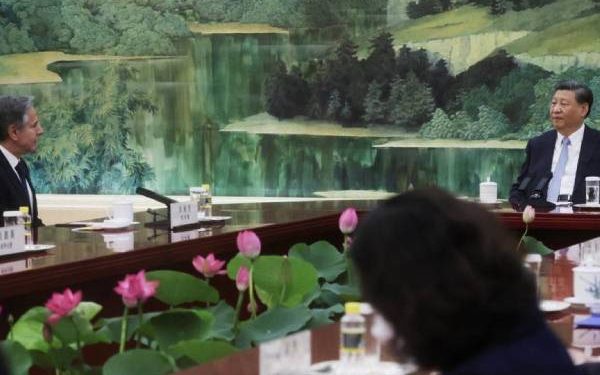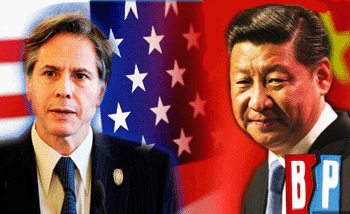Blinken Declares NO Taiwan Independence In China

The US and China have pledged to stabilise their tense relationship following US Secretary of State Antony Blinken’s two-day visit to Beijing.
Mr Blinken met China’s President Xi Jinping for talks on Monday, restarting high-level communications between the rival superpowers.
Mr Xi said they had made progress, while Mr Blinken indicated that both sides were open to further talks.
But the top US diplomat made clear that there remained major differences.
“I stressed that… sustained communication at senior levels is the best way to responsibly manage differences and ensure that competition does not veer into conflict,” Mr Blinken told reporters after the 35-minute meeting at the Great Hall of the People on Tiananmen Square.
“I heard the same from my Chinese counterparts,” he said. “We both agree on the need to stabilise our relationship.”
But Mr Blinken, 61, said he was “clear-eyed” about China and there were “many issues on which we profoundly – even vehemently – disagree”.
Relations between Beijing and Washington have plummeted in the wake of a Trump-era trade war, Beijing’s assertive claims over Taiwan and the shooting down of an alleged Chinese spy balloon over the US earlier this year.
But after the visit by Mr Blinken – the first by a top US diplomat to China in almost five years – Mr Xi suggested relations could be moving in a positive direction.
“The two sides have also made progress and reached agreement on some specific issues,” he said, in a transcript of his remarks released by the US state department. “This is very good.”
The meeting with Mr Xi was not originally on Mr Blinken’s schedule and was announced just an hour before it took place.
It would have been widely viewed as a snub had it not happened, however, especially since Microsoft’s co-founder Bill Gates met Mr Xi in Beijing earlier this week.
Instead, the Americans will be able to point to the secretary’s visit – which also included meetings with China’s top diplomat Wang Yi and Foreign Minister Qin Gang – as a successful re-engagement with the Chinese government after months of frosty relations.
Mr Xi was also sending a message to his own people that his government was reaching out to Washington.
He told his visitor that the international community was worried about Sino-US relations, which would matter for “the future destiny of mankind”.
Mr Blinken agreed it was “absolutely vital” that the two countries continued to communicate.
“This is something we’re going to keep working on,” he said.
US President Joe Biden and officials in Washington have said they view the Chinese as rivals and competitors and not adversaries. It is a fine line to walk, however, as the competition – both militarily and economically – heats up.
Taiwan is the biggest area of contention between the two countries and the one that has the highest potential of escalating.
Mr Wang said it was an issue on which there was “no room to compromise”, while Mr Gang called it “the most important issue in China-US relations and the most prominent risk”.
China sees self-ruled Taiwan as a breakaway province and Mr Xi has indicated that he wishes to bring Taiwan under Beijing’s control during his term in office – if necessary, by force.
However, Taiwan sees itself as distinct from the Chinese mainland with its own constitution and leaders. US President Joe Biden said last year that the US would defend Taiwan in the event of an attack from China, a move condemned by Beijing.
But the US has also stressed its One China policy, meaning there is only one Chinese government.
“That policy has not changed,” Mr Blinken said on Monday. “We do not support Taiwan independence.”
